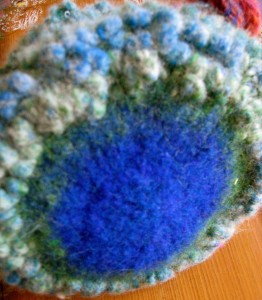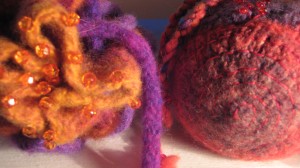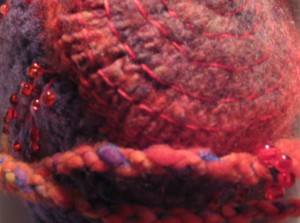bottoms up. . . . . .
I am a graduate of The Textile Arts Diploma Program at Capilano University. My post-secondary education is extensive and has been the focus of my adult life. I am very grateful for what I know. But when it comes to who I am, it is without doubt, my education in the arts that has been the most important. In my work I spend a lot of time talking, and writing about my beliefs in an integrated fine arts education. This forms the core of of my belief system as a teacher. I am intelligent, but my education in the arts is what makes me smart. Without it, I would not be confident enough to take risks, nor would I be willing to get back up each time I am knocked down. Because I am an artist, I am brave and strong, although I am quiet and introspective. My art teaches me to value the process, and helps me to teach my Firsties to value it, too. They have a deeper understanding of the curriculum because they learn with the arts infused through it. I believe that I am a better teacher because I am an artist. I live each day skippingly happy and I know it is the art in my life that makes this possible.
This week it was announced that The Textile Arts Program at Capilano University will cease enrollment immediately. The University is bound by law to balance the budget each year, and this year they are facing a shortfall of $3.1 million. The hierarchy of learning that determines the cuts is at fault here, with academics at the top and the arts at the bottom, and so, the Studio Arts and the Textile Arts programs at Capilano U have been cut.
It’s clear (isn’t it?), that in our world, it is creative people who will succeed; those who are good problem solvers; those who are flexible and can learn, unlearn, and relearn, as Alvin Toeffler states. Yet, when the going gets tough the arts are the first to go. This will be the case as long as the arts are considered nice, but not necessary; as long as they come second, third, or worse, to the academics.
It’s time to get things right, and I am working on that, in my own way. I have spent the morning writing letters, and if you are visiting me here for a read, I am going to take advantage of you, and ask you to do the same . . . please.
Would you please take some time to speak powerfully to those who can help shift this hierarchy, at Capilano University, as a beginning? Here are some links for you:
Adrian Dix Opposition Leader: adrian.dix@bcndp.ca
Christy Clark Premier: premier@gov.bc.ca
Dr. Robin Brayne (chair of the Cap U board): educmast@sfu.ca
Capilano University President Dr. Kris Bulcroft: kbulcroft@capilanou.ca
Here is the University’s statement on its financial situation http://www.capilanou.ca/2013-2014-Budget/
If you need a little fire, here are some wonderful people speaking on the topic of the hierarchy of learning and knowledge:
Elliot Eisner on What do the Arts Teach
Sir Ken Robinson on Cultivating Creativity
“By putting us in touch with our own and other people’s feelings, the arts teach one of the great civilizing capacities – how to be empathetic. To the extent that the arts teach empathy, they develop our capacity for compassion and humaneness . . . It isn’t intellect that connects us to other people; it is feeling. Because people define themselves through their artistic expressions, these expressions communicate their human essence . . . The arts teach respect.” Charles Fowler



